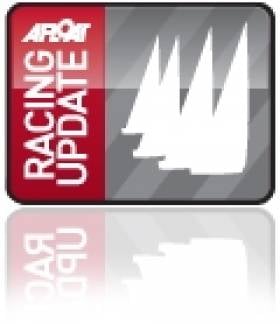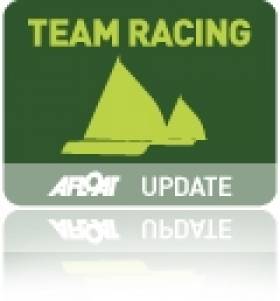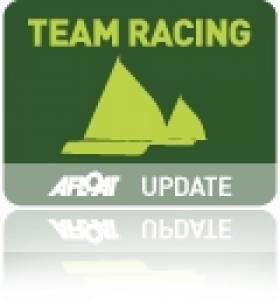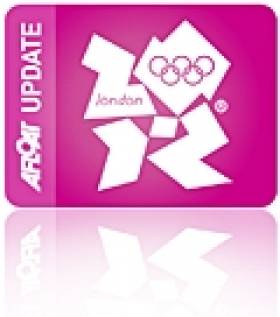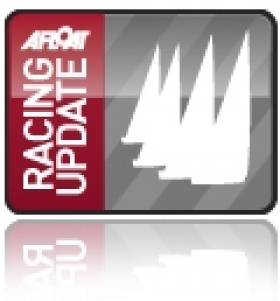Displaying items by tag: Team
Racing Update: World Team Racing, Lasers, Fevas, Fireballs, DBSC, Cruiser Challenge
All the weekend sailing news is wrapped up in a number of posts on Afloat.ie this morning: Schull Welcomes World Team Racers, Espey Wins Lasers, Local Sailor Takes Radials at Lough Derg Nationals, Howth Juniors Win 19-Boat Greystones Feva Event, Royal Cork Celebrates 2011 with 'At Home' Regatta, Supernova to the Fore in DBSC Cruiser Challenge Event, McCartin and Kinsella are New Irish Fireball Champions, Kenefick Steers Chimp to Overall Win at Half Ton Classic Cup, Cork Week Changes Dates for 2012.
Sign up for our newletter coming later this morning!
Schull Welcomes World Team Racers
The seaside village of Schull was en fete yesterday as, in bright sunshine, locals and visitors alike turned out in huge numbers to welcome sailors from around the globe to a world event based in a village setting.
Already, the Australian team , early midweek arrivals, have expressed their wonder and appreciation at the West Cork welcome afforded them, the beauty of the Mizen Peninsula and its proximity to that iconic sailing landmark–the Fastnet Rock.
They have now been joined by teams from the USA, Great Britain, Italy, Spain, Japan, Thailand and Ireland to contest the ISAF World Team Racing Championships throughout this week.
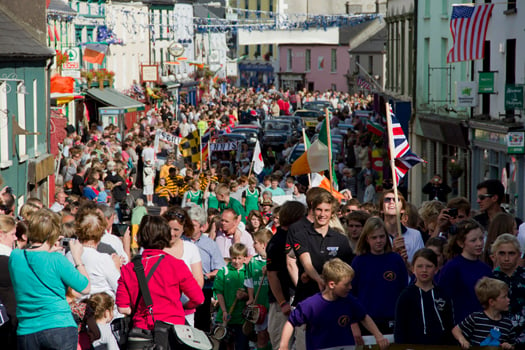
Schull village welcomes the ISAF Team Racing event yesterday. Photo: Brian Carlin. Scroll down for more photos.
The village was a riot of colour as the parade of nations made its way up the main street, with premises flying the flags of their adopted nations and their window displays imaginatively paying tribute to the visiting teams. The parade was led by ten vintage cars, with ten more bringing up the rear, and the ever popular Skibbereen Silver Band Providing the music.
The entourage reflected elements of the sporting, cultural and artistic life of the local area with groups representing Irish traditional music and dance, local youth and sports clubs and Schull Drama Club providing a particularly interactive and quirky element to the proceedings. The international teams, interspersed throughout the parade were treated to a rapturous welcoming reception from the kerbside audience which, judging by their responses, they thoroughly enjoyed.
At the reviewing stand an official welcome from the Schull community was extended by Schull And District Community Council Chairman, Sean Lannin. A charming touch was added to the occasion in the form of each participating country being welcomed in their own language by a native of that country now resident in West Cork, emphasising once again the cosmopilitan nature of the region's population.
The parade continued on its way to The Fastnet Marine and Outdoor Education Centre at Schull Community College where the teams were officially welcomed to the sailing venue by Tim O' Connor, college principal and chairman of the local organising team for the event and by Declan Hurley, Chairman of Cork Council's Western Committee, Cork County Council being one of the major sponsors of the Championship.
There followed a short Irish music and dance performance and a recital by the Skibbereen Silver Band in the spacious marquee erected at the scenic shoreline site.
An informal reception was enjoyed by visitors and community setting the tone for an exciting and enjoyable week both on the water and in the village.
Action on the water kicks off on Monday with a training and familiarisation day in the new and locally built TR3.6 metre dinghies. Practice Race Day takes place on Tuesday with Championship Racing on Wednesday, Thursday and Friday. World Youth Finals take place on Saturday and World Open Finals and Prizegiving Ceremony on Sunday, September 4.
Ireland to Join World's Top Team Racers for UK Battle
In less than a month's time, Dun Laoghaire's Royal St. George Yacht Club will join the world's best team racers in the United Kingdom for the sixty-second edition of the Wilson Trophy British Open Team Racing Championship, hosted and organised by West Kirby Sailing Club.
This year's Wilson Trophy, which will take place on the Marine Lake in West Kirby from the 6 - 8 May, has, as expected, attracted another high quality entry list, with the 32 selected teams coming not only from the length and breadth of the United Kingdom, but from Ireland and the United States as well.Sailing in identically matched, colour coded Firefly dinghies, used exclusively for this event, the 32 teams will fight it out over three days of Swiss league and elimination rounds, culminating in a thrilling Grand Final to be sailed in front of a packed spectator grandstand on the final afternoon.
The Wilson Trophy is a major logistical undertaking. Over the 3 days, more than 300 races are started, finished, accurately scored and uploaded to the online rolling results service. On the water, a twenty-five strong team of international umpires are on hand to give instant decisions on rule infringements and dish out the appropriate penalties. And to keep the throngs of spectators on shore happy and well informed, an expert commentary team broadcasts live updates on all the action out on the lake.
With many of the teams yet to confirm their final sailor line-up, an assessment of potential form is difficult at this stage. Suffice it to say however that the great and the good of the team racing world will be in West Kirby for this year's Wilson Trophy.
2010 winners, Team Extreme from the USA are back to defend their title and will be looking to reproduce the calm and composure with which they swept undefeated through the qualification rounds last year, before inflicting an uncharacteristic and uncomfortable 3 - 0 whitewash defeat on local heroes the West Kirby Hawks, in the Grand Final. For their part, the West Kirby Hawks will no doubt be out for revenge and keen to expunge the memories of that 2010 final. If recent form is anything to go by, the the Hawks look to have hit their peak at just the right time. By all accounts they were on ruthless form at the recent UK RYA National Team Racing Championship; blazing through the elimination rounds undefeated before summarily dismissing locals Spinnaker Auspicious in the final, to retain their UK National Team Racing Champions title.
However with top quality teams like the Woonsocket Rockets (USA), the Royal St George Yacht Club (IRL) and the New York Yacht Club (USA) and several others with their eyes fixed on a Wilson Trophy victory, Team Extreme and the West Kirby Hawks will have their work cut out if they are to set up a return Grand Final showdown.
O'Leary and Burrows Lie Fourth at Bacardi Cup
Peter O'Leary and David Burrows lie fourth overall at the halfway stage of the Star class Bacardi Cup in Miami today having posted a 7, 2 and 5 in the 93-boat fleet. Promisingly for the Cork-Dublin duo their top results have also been achieved across the wind range, a fact that must bode well for the remaining three races of the series on Biscayne Bay. Full Results HERE. A podcast with Olympic team manager James O'Callaghan is below:
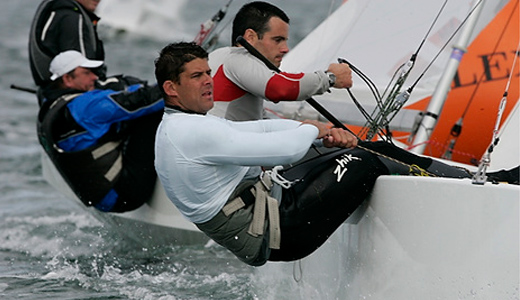
Peter O'Leary and David Burrows - fourth at the half way stage of the Bacardi Cup. Photo: Ingrid Abery. More HERE
Team Racers Head for Schull
This season's Irish Team Racing Association's (ITRA) National Team Racing Championships will be sailed in Schull on 13th - 14th November. As excitement mounts for next year's ISAF Team Racing Worlds, entries for this year's event have hit a record 21. With 4 teams travelling from the UK, 6 Youth teams, all from Munster, the two Royal St George teams, quarter finalists in this years UK Open (better known as the Wilson Trophy), plus the top college teams the competition should be intense.
To ensure that the competition is fair and sailed to the rules the umpire team includes 4 International Umpires, and includes umpires from the USA, the UK and even Dublin. Race organisation by the Fastnet Marine and Outdoor Education Centre will provide a full dress rehearsal for next year's event. A presentation of plans for the Worlds will be held on Saturday evening, but for competitors the major attraction will be the opportunity to sail the prototype of the specially designed boat that will be used next year.
Following this event the top Irish team racers will be invited to put themselves forward for selection for the teams to represent Ireland in both the Open and under 19 categories at the Worlds. ITRA will invite selected teams to a trial event to be held early in 2011.
For further information please contact: Gordon DAVIES, Secretary, Irish Team Racing Association. Ph; 086 150 1220



























